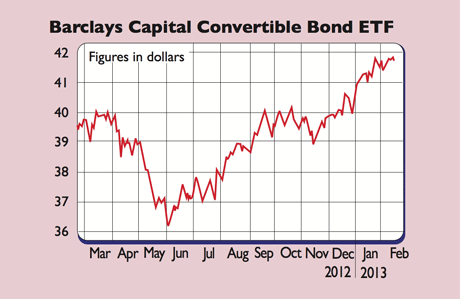What are convertible bonds and should you buy them?
Since the start of the year, there has been a flurry of convertible bonds being issued. Tim Bennett explains how they work, and reveals one way you can get in on the action.
Get the latest financial news, insights and expert analysis from our award-winning MoneyWeek team, to help you understand what really matters when it comes to your finances.
You are now subscribed
Your newsletter sign-up was successful
Want to add more newsletters?

Twice daily
MoneyWeek
Get the latest financial news, insights and expert analysis from our award-winning MoneyWeek team, to help you understand what really matters when it comes to your finances.

Four times a week
Look After My Bills
Sign up to our free money-saving newsletter, filled with the latest news and expert advice to help you find the best tips and deals for managing your bills. Start saving today!
Since Christmas, investors have been back in the mood to take some risks. Convertible bond issuers have taken note. So far, 2013 has been "the strongest start to the year on record for volumes", according to Alexandra Stevenson at the Financial Times.
This is quite a turnaround not so long ago fund managers were warning that the market "stood on the brink of extinction amid a drought of issuance". So why are convertibles flavour of the month, and should you buy them?
How do they work?
A convertible is a hybrid' security. It starts off as a standard IOU or fixed-income bond that offers a coupon of, say, 6% paid to the bond holder at regular intervals typically semi-annually. However, rather than being bought back by the issuer at its redemption or maturity date, like a normal bond, it can be converted into shares instead.
MoneyWeek
Subscribe to MoneyWeek today and get your first six magazine issues absolutely FREE

Sign up to Money Morning
Don't miss the latest investment and personal finances news, market analysis, plus money-saving tips with our free twice-daily newsletter
Don't miss the latest investment and personal finances news, market analysis, plus money-saving tips with our free twice-daily newsletter
The terms are agreed up front so a conversion ratio' determines how many shares the holder gets when they give up their bond and an agreed future conversion date, or series of future dates, when they need to decide. On conversion, the bond holder becomes the owner of ordinary shares in the same company instead. If they don't convert, the bond is bought back in the normal way.
Why would you buy them?
Companies from steel giant ArcelorMittal ($2.25bn) to Italian oil and gas operator Eni ($1.67bn) have been issuing convertibles, but why? They are viewed by many issuers and investors as a win-win. There are two major benefits for the issuer.
Firstly, because the option to convert later into shares is offered to the investor, the interest rate on a convertible is usually lower than it would be for a standard, non-convertible bond. Also, if the holders convert, the company saves itself the cash outflow that would be needed to buy back the bond. What's more, it saves a firm having to tap shareholders for cash or dilute existing ones by going after more share capital.
MoneyWeek videos

What convertibles reveal about the stock market
Tim Bennett looks at what all this activity tells investors.
Watch all of Tim's videos here
For an investor, a convertible offers the chance to have your cake and eat it. If the issuer's share price rockets while the bond is in issue, conversion into shares could be very profitable (although issuers usually give themselves an option to call in the bond at a lower price should share prices spike sharply on a conversion date).
However, if the share price plunges after the bond has been bought, the investor knows that they will still get a reasonable interest rate and the bond will be bought back at some point. Plus, if the firm folds, convertibles rank higher than shares.
Why the rush into them right now?
Bulls would say the return of convertibles is a sign of confidence. Investors are willing to take a risk on conversion terms in the hope of getting the best of both worlds: bond-like stability followed by a windfall later.
But there's a less rosy view when institutional investors buy convertibles, they're signalling that they see the top of the market approaching and are hedging their bets. Rather than buy shares in risky firms, they want the safety net of a bond with a fixed income, plus an option to get into shares should their pessimism prove unfounded.
Should you join the rush?
Playing convertible bonds direct as a retail investor is nigh on impossible. Issuance tends to be restricted to institutional clients with a minimum investment of £25,000 or higher. And even if you could buy into an individual bond issue, you wouldn't want to because convertibles are quite complex (this is a product that combines a standard bond with a call option) and spreading your risk (diversifying') is tricky unless you have lots of money and know what you are doing.

But there are a handful of funds available if you'd like a punt on this rapidly changing market. One of the biggest, most diversified and cheapest, with a yield of 3.88% and an expense ratio of 0.4%, is the SPDR Barclays Capital Convertible Bond ETF (NYSE: CWB). It tracks around 120 issuers, and is up just under 10% for the last 12 months and just under 4% for the year so far.
What's a 'conversion premium'?
You will often see investors and issuers refer to a conversion premium'. This is fairly key it's how far the share price of the issuer needs to rise to make conversion worthwhile for a holder of the bond.
To take a very simple example, let's say you can swap the £1,000 nominal value of a bond for 500 shares. The conversion price is therefore £2 (£1,000/500). Now, let's say the current share price is only £1.50. The conversion premium is 50p (£2-£1.50), or expressed as a percentage it's 33% (50p/150p).
This matters in part because, when the share price is a long way below the conversion price, a convertible will behave much like any other bond for example, its price will react to changes in interest rates.
However, once the share price gets close to the conversion price, the bond's price is far more heavily influenced by what is happening to the firm's share price.
Get the latest financial news, insights and expert analysis from our award-winning MoneyWeek team, to help you understand what really matters when it comes to your finances.
Tim graduated with a history degree from Cambridge University in 1989 and, after a year of travelling, joined the financial services firm Ernst and Young in 1990, qualifying as a chartered accountant in 1994.
He then moved into financial markets training, designing and running a variety of courses at graduate level and beyond for a range of organisations including the Securities and Investment Institute and UBS. He joined MoneyWeek in 2007.
-
 How a ‘great view’ from your home can boost its value by 35%
How a ‘great view’ from your home can boost its value by 35%A house that comes with a picturesque backdrop could add tens of thousands of pounds to its asking price – but how does each region compare?
-
 What is a care fees annuity and how much does it cost?
What is a care fees annuity and how much does it cost?How we will be cared for in our later years – and how much we are willing to pay for it – are conversations best had as early as possible. One option to cover the cost is a care fees annuity. We look at the pros and cons.